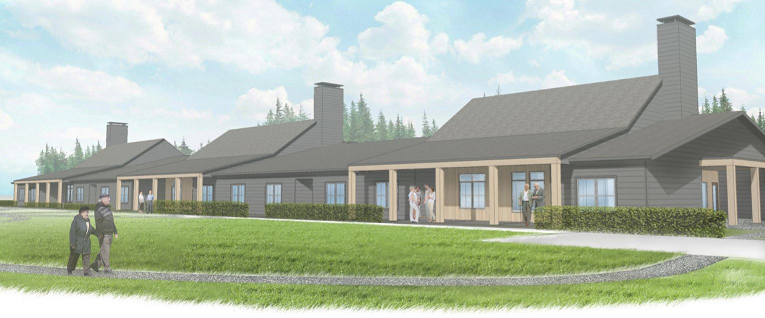Gateway: News
The Mustard Seed Project will break ground Saturday on the Key Peninsula’s first assisted-living and memory-care home, built on a model that provides a home-like atmosphere for small living groups, the organization says.
The Key Peninsula nonprofit worked with The Green House Project, a national senior advocacy group, to design the complex on what it called a “small-home model,” with resident rooms surrounding a common living area, according to Sara Thompson, the Mustard Seed Project board chair. “This is a model that has more or less revolutionized care for seniors,” said Thompson, a retired family-care physician. “It gives seniors a much more home-like atmosphere.”
“This is a model that has more or less revolutionized care for seniors,” said Thompson, a retired family-care physician. “It gives seniors a much more home-like atmosphere.”
The 5-acre parcel will hold a “longhouse” of three connected small homes each with 10 private bedroom-studios. Each home will have its own entrance and a shared hearth, kitchen, and dining area. Two homes will provide assisted living; one will serve those requiring memory care, the organization said. “It’s 10 people living in a shared home, with a living room and a kitchen, rather than 30 or 40 people living in isolated rooms and coming down to a dining hall,” Thompson said.
Each bedroom-studio will have a small kitchenette with a microwave and a coffee maker, and the rooms will open out into a common area with a fireplace, seating and a larger kitchen. “There will be someone to do the cooking, but if residents want to cook something themselves, they can,” Thompson explained. “If a family wants to come and bake cookies, they can.”
PROPERTY ON 5 ACRES
The complex in Key Center will be built on property the Mustard Seed Project bought in 2016, across the street from its offices at 9016 154th Ave. It will house about 30 seniors who need nursing or memory care.
The project is slated for completion in 2022. It will be financed by a $7.8 million Rural Development loan from the U.S. Department of Agriculture, and about $5.7 million in support from Pierce County, the state of Washington and private foundations.
The project took seven years, from the germ of an idea to groundbreaking, Thompson said.
“As one of our board members said, ‘We didn’t know it was impossible,’” she said. “It took a lot of perseverance, a lot of optimism. We just kept saying to ourselves: ‘We’ve come this far, we can’t go back now.’ And in the end, optimism won out.”
The facility will be operated by Concepts in Community Living, a for-profit nursing home operator based in Clackamas, Oregon. The company has 12 facilities in Oregon, and three in Washington, at North Bonneville, Stevenson and Wenatchee. Mustard Seed will retain ownership of the property.
The architect is Rice Fergus Miller (RFM) of Bremerton and the general contractor will be Korsmo Construction of Tacoma.
SENIORS WITH NOWHERE TO GO
With a population of about 17,500, the Key Peninsula currently has no assisted-living facilities.
That means, said longtime KP physician Dr. William Roes: “When someone loses their spouse or caregiver, options evaporate and they’re forced to leave the Key Peninsula — because there are no assisted living options here. Now, that’s about to change.” Roes was quoted in the Mustard Seed release announcing the project.
Green House-designed campuses gained attention during the COVID-19 pandemic when such homes logged significantly lower infection and death rates than traditional nursing homes, Mustard Seed said. Since 2003, these small-home communities have generated demonstrably better health outcomes for elders, great satisfaction for residents and families alike, and lower workforce turnover, the organization said.
Because the home care workers are less specialized than in large facilities — care workers take turns bathing, medicating and cooking for the residents in their own 10-person module — “they have much better job satisfaction, better relationships with residents and their families, and more variety in their work,” Thompson said.
Thompson said she thinks the lower rate of infection in Green House-style homes results from “fewer people going in and out all the time” and a smaller number of residents in contact with one another.
KNOWN FOR SENIOR RIDES
_
Source of Article: The News Tribune
By Gateway Staff
October 17, 2021
https://www.thenewstribune.com/news/local/community/gateway/g-news/article255022122.html



0 Comments